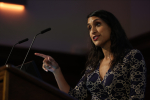I congratulate my right hon. Friend the Member for Basingstoke (Mrs Miller) on initiating this important debate.
As ever, it is a pleasure to follow the hon. Member for Canterbury (Rosie Duffield) and the many hon. Members who have spoken so movingly about the women in Ukraine and women facing the most severe violence in this country.
In the spirit of this year’s theme “Break the Bias”, I want to focus my remarks on girls and women in science, maths and tech careers. I want to start by telling two stories.
Born in 1815, Ada Lovelace was the child of poet Lord Byron and mathematician Lady Byron, and had a passion for mathematics from an early age.
Despite childhood illness, Ada let nothing hold her back. Aged 12, she decided she wanted to fly. She examined the anatomy of birds and explored the best materials to create herself a set of wings. As a teenager—at just 18—she was working with mathematician Charles Babbage on one of the very first computers, almost 200 years ago.
Despite later marrying and becoming a countess, Ada did not give up her passion for a life of leisure, and her work on the analytical engine means that she is widely recognised as one of the world’s first computer programmers.
Half a century after Ada was born, Agnes Pockels was born in Germany.
She could not study at university like her brother because women were not allowed to at the time, and she had sick parents at home and therefore a lot of caring responsibilities. Stuck at home carrying out all the household chores, which I am sure we will all recognise, Agnes noticed soap building on the surface of her washing water.
Aged 18, she began conducting experiments at home to understand more, and although she was locked out of accessing scientific literature, this did not stop Agnes. In 1891 she published her first scientific paper “Surface Tension” and she is now recognised as a pioneer in the field of surface science.
If we ask ourselves why we are here today, it is because women have historically been disenfranchised, disempowered and devoiced. Women have been shut out of the room where decisions are made and locked out of the jobs with the highest returns.
I am glad that today we can celebrate much progress since the time of Ada and Agnes, but the fact is that women are still playing catch-up after centuries and centuries of inequality.
PhD computer and data scientists are powering the economy, creating new billion-dollar companies in life sciences, artificial intelligence, fintech, health tech and beyond.
Jeff Bezos, Elon Musk and Mark Zuckerberg—three of the richest people on the planet—were all STEM students and they now lead companies that are shaping the world around us, with arguably more power and certainly more wealth than our political leaders. In the years ahead the new Wall Street is going to be a wet lab.
We know that STEM subjects are some of the highest value added courses for future earnings. We also know that demand is surging for people to fill new high-quality tech and data science jobs.
This field is now where the decisions are being taken and where the high-return jobs are being created. I want women to get their fair slice of the economic pie so that we are not playing catch- up in the decades to come.
Since 2010, under successive Conservative Governments, the number of women accepted on full-time STEM undergraduate courses in the UK has increased by almost 50%, but women still remain deeply under-represented in STEM subjects.
Girls are only half as likely as boys to say that their strongest subject is science or maths, despite the fact that we know that they now regularly outperform boys in these subjects.
A Girlguiding survey last year showed that over half of 11 to 21-year-old girls and women said that they felt that STEM subjects were more for the boys.
Only 14.5% of engineers are women, and only 13% of STEM workers at management level are women.
This is bias at work, and for the future of equality in this country we need to break it. There could not be a better time.
The success of the covid vaccine roll-out is an inspiration to so many young women in this country, who want to be the next Kate Bingham, Professor Sarah Gilbert or Dr Emily Lawson—or perhaps the next Ada Lovelace or Agnes Pockels.
Luckily, today we live in an open society where women can access the world of academia, science and enterprise.
However, we are still fighting centuries of bias.
That is why I am delighted to be working with our fantastic Children’s Commissioner Dame Rachel de Souza to encourage more women into advanced mathematical courses in particular. We will be hosting a roundtable later this month, so if any fellow Members are interested, please do get in touch.
It is of the utmost importance to ensure that in the centuries ahead women are not playing catch-up once again.

